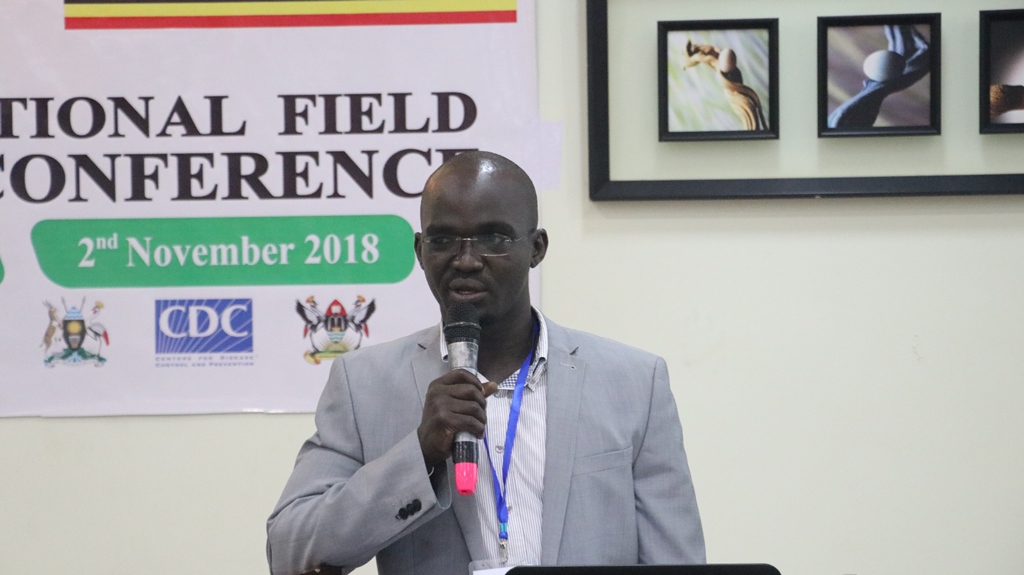
(Denis Okethwangu presenting an Abstract on the Prevalence of HIV, and Associated Factors for Infection, among Men who have sex with men in Ugandan Prisons, 2013 - 2014)
On November 2nd, 2018, the Uganda Public Health Fellowship Program (PHFP) successfully held their annual conference at Imperial Hotel in Kampala. The 4th of its kind, the conference theme this year was ‘Building a Resilient Workforce to Strengthen Disease Surveillance and Outbreak Response.’
At these conferences, Fellows present their findings of the investigations and epidemiologic studies conducted since they joined the program. Through these investigations and studies, Fellows have uncovered important public health problems facing the country and have made recommendations to address them.
Commenting about the conference, Dr Alex Ario, the Coordinator of the program who is also the Acting Director of the Uganda National Institute of Public Health at the Ministry of Health said the event is a showcase and a sharing of experiences with the different stakeholders that are involved in public health response.
Giving a background about the Fellowship, Dr Ario explained that the program which has its secretariat at the Ministry of Health was conceived five years ago. “It is a post Master’s program that trains public health professionals of different careers that are not limited to sciences. We train them for about 8 weeks only before they are placed for practical work. The purpose of the program is to strengthen the surveillance and epidemiological response of the Ministry,” he explained further.
The Conference was opened by Prof Rhoda Wanyenze, the Dean of MakSPH, among others. In attendance were national and international public health experts, important dignitaries from the Ministry of Health and from key partner institutions including UN agencies, Embassies and University officials.
This year’s conference had 16 presentations that were categorized into six major groupings. The six included zoonotic diseases (One Health) under which findings on the recent Anthrax and Ebola outbreaks were disseminated; foodborne diseases which looked at cholera and food poisoning. Under vectorborne diseases, malaria was examined in two presentations that looked at vector breeding sites in Nwoya District, and at disease outbreak facilitated by human activities around a swamp in Kisoro district. One of the presentations under HIV/Aids focused on the low proportions of pregnant women who know their HIV status at their First Antenatal Care Visit. Claire Biribawa one of the Fellows presented under the Non-Communicable Diseases category on the “Incidence and Trends of Road Traffic injuries in Kampala District”. The sixth category had research findings presented under the Vaccine Preventable Diseases (VPDs) of maternal and neonatal tetanus, and on the meningococcal Meningitis Outbreak that took place in Western Uganda in 2017.
Prof David Serwadda, the former Dean of MakSPH told the media that the conference is a means through which Fellows of the program disseminate work they have been carrying out for the last one year.
“The Fellows are able to inform us about the various epidemics that have taken place in the country ranging from tetanus, meningitis to malaria and cholera,” he said, adding that, “This Fellowship aims at building a workforce cadre who can competently manage any disease outbreak in Uganda. The presentations give us an idea about what the Fellows have been up to.”
At the closing ceremony, Dr Serwadda thanked the people who have been steering this program for the last four years. He also thanked the American taxpayers who through this program, have been investing in the health of Ugandans.
Dr Yonas Tegegn Woldemariam, the Country Representative of the World Health Organisation (WHO) commended the researchers and mentioned that WHO is always available to provide technical input. He implored the audience to strive in ensuring that epidemiology drives policy.
“As you are aware, WHO guidelines are grounded in research policy,” he pointed out. He also encouraged the researchers to put effort into having “timely dissemination of findings in order to influence timely responses” arguing that this is the only way in which findings can be beneficial to the public.
The well-attended conference had Fellows who are currently with the program presenting from different tracks that include among others Food-borne Illnesses, Vector-Borne Diseases, Non-Communicable Diseases and Zoonotic Diseases. The US Ambassador to Uganda, Her Excellency Deborah Malac also attended the function.
About the Fellowship
The PHFP is a capacity building program that is currently being implemented by the Ministry of Health (MoH) in conjunction with Makerere University School of Public Health (MakSPH) and the US Centers for Disease Control and Prevention (CDC). Running for the 4th year, this year, the two-year training-in-service program aims at equipping public health professionals with skills they need to manage public health challenges.
All the Fellows are placed in priority programs and institutions of MoH where they have been involved in institutional activities as well as programs where they are enabled to attain core competencies in response to public health emergencies, epidemiological studies, public health surveillance, scientific communication as well as leadership and management.
Since its inception in 2015, the program has enrolled 4 cohorts of 41 Fellows. The 5th cohort of 14 Fellows is due to join the program in January 2019.

